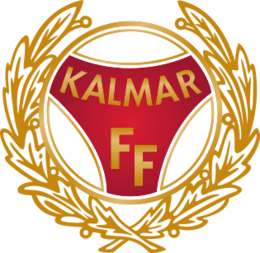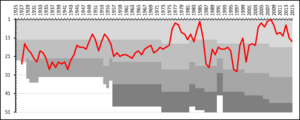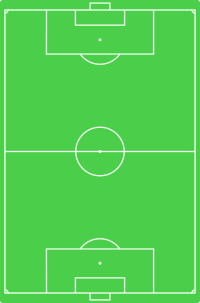Kalmar FF facts for kids
 |
||||
| Full name | Kalmar Fotbollförening | |||
|---|---|---|---|---|
| Nickname(s) | Röda bröder (Red brothers), Smålands stolthet (The pride of Småland) | |||
| Short name | KFF | |||
| Founded | 15 June 1910 (as IF Göta) | |||
| Ground | Guldfågeln Arena, Kalmar | |||
| Capacity | 12,000 | |||
| Chairman | Anders Henriksson | |||
| Head coach | Toni Koskela | |||
| League | Superettan | |||
| 2024 | Allsvenskan, 15th of 16 (relegated) | |||
|
||||
Kalmar Fotbollförening, usually called Kalmar FF, is a professional football club from Kalmar, Sweden. The club is part of the Smålands Fotbollförbund and plays its home games at Guldfågeln Arena. Kalmar FF was started on June 15, 1910. They have won one Swedish national championship (in 2008) and three national cup titles (in 1981, 1987, and 2007).
KFF has played 35 seasons in Allsvenskan, which is Sweden's top football league. They first joined Allsvenskan in 1949. The club is ranked 13th in the all-time Allsvenskan standings. Kalmar FF is one of only 14 Swedish clubs that have won both the national championship and the national cup. They are also one of 14 clubs that have always played in one of Sweden's top three football leagues.
Kalmar FF's main local rivals are Östers IF. In the 1980s and 90s, Kalmar AIK was also a big rival.
Contents
The Story of Kalmar FF
How It All Started
On June 15, 1910, a club called IF Göta was formed. However, they couldn't join the Riksidrottsförbundet because other clubs already used that name. These were Stockholm's-Göta and Karlstads-Göta. So, in 1912, the club changed its name to IF Gothia and was then accepted.
In 1918, the Fredriksskans stadium opened. Around the same time, there was a big meeting in Kalmar about too many clubs in the town. This led to IF Gothia and Kamraterna joining together to form Kalmar Idrotts Sällskap. Also, Kalmar IK and Falken merged to create Kalmar AIK. In 1927, Kalmar Idrotts Sällskap changed its name to Kalmar FF.
In the 1927–1928 season, Kalmar FF qualified for a local league. IFK Oskarshamn won that league and was supposed to move up to the South Swedish league. This league covered both Småland and Skåne. However, IFK Oskarshamn gave up their spot, and it was given to Kalmar FF instead. Clubs in Skåne complained because there were no good train connections to Kalmar back then. But SJ (the Swedish railway company) solved the problem. In their first game in the new league, Kalmar FF beat Malmö FF 6–0.
The Middle Years
In 1949, Kalmar FF reached Allsvenskan for the very first time. They won the deciding game against Halmstads BK. Back then, Swedish leagues were played from autumn to spring. On July 31, Kalmar FF played their first Allsvenskan game against Degerfors IF and lost 2–0. After that game, Gunnar Nordahl, who later became world-famous, said he had seen much worse new teams. Also, on September 4 of that year, Kalmar FF played Malmö FF in front of 15,093 fans. This is still the record attendance at Fredriksskans.
Between 1950 and 1955, the club moved between Allsvenskan and Division 2. In 1955, they dropped down to Division 2 and stayed there for 20 years. During this time, players like Hungarian Ference Marko played for the club. He lived at a refugee camp in Borgholm in 1957. In 1959, Sune "Mona-Lisa" Andersson, who won an Olympic medal as a player in 1948, became manager. During this period, Sten-Åke Johansson played for the club and became their all-time top goalscorer. On October 19, 1975, Kalmar FF beat Västra Frölunda and returned to Allsvenskan.
In 1976, the club played its 100th game in Allsvenskan against GIF Sundsvall. However, they lost 9–2, and manager Kay Wiestål was fired. The 1977 season was the club's most successful so far. A group of companies helped the club buy Benno Magnusson. The club finished in 3rd place that season, earning their first medal.
In 1981, the club won its first ever title. They beat IF Elfsborg 4–0 to win the Svenska Cupen for the first time. However, they couldn't stay in Allsvenskan and were moved down to Division 1. But they only stayed there for one year and returned in 1983.
The year 1985 was the club's most successful season. They finished in second place behind Örgryte IS. Both Billy Lansdowne and Peter Karlsson became the league's top goalscorers, along with Sören Börjesson from Örgryte IS. All three scored 10 goals each. The next year was not as good. The club was moved down from the top league. The only good news in 1987 was when the club won the Cup title again, this time against GAIS. However, the club also dropped out of Division 1 that year.
In 1988, Kalmar FF won Division 2 without losing a single game. This is a record in Division 2 and higher leagues. Between 1989 and 1997, the club mostly played in the second-highest league. This caused serious money problems for the club.
The Brazilian Era
Kalmar FF returned to Allsvenskan in 1998, but in 1999, they dropped out again. The good news was that their money problems were fixed, and the club was in good shape again. During the 2000 season, the club had to fight hard to avoid being moved down from the second-highest league. They only managed to stay up at the very end of the season.
The goal for the 2001 season was to return to Allsvenskan. After buying several new players like Lasse Johansson, Fredrik Gärdeman, and Lucas Nilsson, the club managed to get back to Allsvenskan. Sadly, they were moved down again right away. In 2002, the first Brazilian player, Alysson, joined the club.
Kalmar FF only spent one year in Superettan in 2003. They won the league easily, far ahead of Trelleborgs FF. Buying Daniel Mendes and Dudu helped the club a lot.
In 2004, the club bought three more Brazilian players: Dedé Anderson, Fábio Augusto, and César Santin. They all helped the club finish in 5th place in Allsvenskan, just missing out on the Royal League. The club also got a new chairman, Tommy Strandman, after Ronny Nilsson left after 12 years.
Becoming Champions
In 2005 and 2006, Kalmar FF finished 3rd and 5th. Then, in 2007, they had a fantastic season from start to finish. They ended up in second place, just behind the champions IFK Göteborg. They also won the Svenska Cupen that same year by beating IFK Göteborg 3–0 at Fredriksskans in Kalmar.
Before the 2008 season, many Swedish football experts thought Kalmar FF would be one of the teams fighting for the championship. The club started the season well, and as it went on, they played even better. They won many games by big scores. The only other team that could keep up was IF Elfsborg. Kalmar FF had to wait until the very last match of the season against Halmstads BK in Halmstad to become champions. Before that final match, Elfsborg was 3 points and 9 goals behind. The game against Halmstads BK ended 2–2, which put Kalmar FF 1 point ahead of Elfsborg. Patrik Ingelsten also became the league's top goalscorer that season with 19 goals.
The team reached the final of the Svenska Cupen again in 2008, once more against IFK Göteborg. However, this time IFK won 5–4 on penalties after the game ended 0–0. Kalmar FF also had a chance to reach the group stage of the UEFA Cup. They played strongly against Racing FC from Luxembourg and Gent from Belgium. Then they faced the Dutch team Feyenoord. After winning 1–0 away in Rotterdam, the club lost 1–2 at home. This home game was played in Borås at Borås Arena because Fredriksskans didn't meet UEFA's requirements. Kalmar FF was knocked out of the competition because of the away goals rule.
Team Colors and Kits
Kalmar FF's colors and kits have changed many times over the years. When the club started in 1910, they wore green and red stripes. In 1915, it changed to red shirts and black shorts. After 1927, they had red-white striped shirts and red shorts. From 1934-35, they went back to red shirts and black shorts. In 1940, it was red-and-white striped shirts and red shorts again. Kalmar FF first wore the full red shirt and white shorts, like they do today, in 1944. From 1952–56, like many other Swedish clubs, they wore the popular Arsenal style kit with white sleeves.
Kit Makers and Sponsors
The club's first kit maker was Adidas. Then, Umbro made their kits from 1995. Puma took over in 1998 and made their kits for seventeen years. In 2016, Hummel became the new kit maker for the club.
| Period | Kit manufacturer | Shirt sponsor (chest) |
|---|---|---|
| 1977–80 | Adidas | – |
| 1980–88 | Kalmar Verkstad | |
| 1989–92 | Sparbanken | |
| 1993–94 | RIFA, Sparbanken | |
| 1995 | Umbro | |
| 1996–1997 | Sparbanken | |
| 1998–2005 | Puma | Flextronics, Föreningssparbanken |
| 2006 | antilop.se, Föreningssparbanken | |
| 2007–2009 | Audio Video, SAS | |
| 2010–2011 | Audio Video | |
| 2012–2015 | Hjältevadshus | |
| 2016– | Hummel |
Playing in Europe
Kalmar FF has played in several European club competitions. These include the UEFA Champions League, UEFA Cup (now Europa League), UEFA Cup Winners' Cup, and UEFA Europa Conference League.
- Q = Qualifying round
| Season | Round | Opponents | Home leg | Away leg | Aggregate |
|---|---|---|---|---|---|
| 2009–10 | Q2 | 3–1 | 0–2 | 3–3 (a) |
| Season | Round | Opponents | Home | Away | Aggregate |
|---|---|---|---|---|---|
| 1979–80 | 1 | 2–1 | 0–1 | 2–2 (a) | |
| 1986–87 | 1 | 1–4 | 0–3 | 1–7 | |
| 2008–09 | Q1 | 7–1 | 3–0 | 10–1 | |
| Q2 | 4–0 | 1–2 | 5–2 | ||
| 1 | 1–2 | 1–0 | 2–2 (a) | ||
| 2010–11 | Q1 | 1–0 | 3–0 | 4–0 | |
| Q2 | 0–0 | 2–0 | 2–0 | ||
| Q3 | 1–1 | 2–5 | 3–6 | ||
| 2012–13 | Q1 | 4–0 | 0–1 | 4–1 | |
| Q2 | 3–0 | 3–1 | 6–1 | ||
| Q3 | 1–0 | 0–3 | 1–3 |
| Season | Round | Opponents | Home | Away | Aggregate |
|---|---|---|---|---|---|
| 1978–79 | 1 | 2–2 | 2–0 | 2–4 | |
| 1981–82 | 1 | 3–2 | 2–1 | 4–4 (a) | |
| 1987–88 | 1 | 1–0 | 0–0 | 1–0 | |
| 2 | 1–0 | 5–0 | 1–5 |
| Season | Round | Opponents | Home leg | Away leg | Aggregate |
|---|---|---|---|---|---|
| 2023–24 | Q2 | 1−2 | 1−2 | 2−4 |
UEFA Club Ranking
Here's where Kalmar FF ranks among European clubs by UEFA (as of March 25, 2024):
| Rank | Team | Points |
|---|---|---|
| 293 | 4.375 | |
| 294 | 4.375 | |
| 295 | 4.375 | |
| 296 | 4.300 | |
| 297 | 4.300 | |
| 298 | 4.300 | |
| 299 | 4.300 |
Players
Current Squad
Here are the players currently on the Kalmar FF team:
|
|
Players on Loan
These players are currently playing for other teams on a temporary basis:
|
|
Retired Jersey Numbers
Some jersey numbers are so special that no other player will wear them again. This is to honor players who were very important to the club.
|
Club Management
Board Members
These people help run the club from behind the scenes:
Technical Staff
This team helps the players and coaches with training and other football-related tasks:
| Name | Role |
|---|---|
| Manager | |
| Assistant coach | |
| Assistant coach | |
| Individual coach | |
| Goalkeeping coach | |
| Academy director | |
| Team coordinator | |
| Sports director | |
| U16 Trainer | |
| Groundkeeper |
Club Managers Through the Years
Here is a list of the managers who have led Kalmar FF:
 Gustaf Andersson (1936–38)
Gustaf Andersson (1936–38) Gösta Carlsson (1938–44)
Gösta Carlsson (1938–44) Arne Rasmussen (1944)
Arne Rasmussen (1944) Gösta Carlsson (1945–49)
Gösta Carlsson (1945–49) Otto Cinadler (1946–47)
Otto Cinadler (1946–47) Olle Ericsson (1949–50)
Olle Ericsson (1949–50) István Wampetits (1951–55)
István Wampetits (1951–55) Bert Turner (1955–56)
Bert Turner (1955–56) István Wampetits (1956–58)
István Wampetits (1956–58) Olle Ericsson (1958)
Olle Ericsson (1958) Sune Andersson (1959–61)
Sune Andersson (1959–61) Gösta Carlsson (1962)
Gösta Carlsson (1962) Bertil Bäckvall (1963–66)
Bertil Bäckvall (1963–66) Bertil Wennerström (1967–68)
Bertil Wennerström (1967–68) Jószef Kovács (1969)
Jószef Kovács (1969) Lars Arnesson (Jan 1, 1970 – Dec 31, 1972)
Lars Arnesson (Jan 1, 1970 – Dec 31, 1972) Bo Johansson (1973 – Dec 31, 1973)
Bo Johansson (1973 – Dec 31, 1973) Göran Andersson (1974)
Göran Andersson (1974) Kay Wiestål (1975–76)
Kay Wiestål (1975–76) Eivert Bladh (1976)
Eivert Bladh (1976) Bo Johansson (1977–78)
Bo Johansson (1977–78) Bo Falk (1979–81)
Bo Falk (1979–81) Bo Johansson (1982–83)
Bo Johansson (1982–83) Allan Hebo Larsen (Jan 1, 1984 – Dec 31, 1986)
Allan Hebo Larsen (Jan 1, 1984 – Dec 31, 1986) Jan Sjöström (1987)
Jan Sjöström (1987) Göran Andersson (1987–88)
Göran Andersson (1987–88) Börje Axelsson (1988–90)
Börje Axelsson (1988–90) Alf Westerberg (Jan 1, 1991 – Dec 31, 1992)
Alf Westerberg (Jan 1, 1991 – Dec 31, 1992) Kalle Björklund (Jan 1, 1993 – Dec 31, 1993)
Kalle Björklund (Jan 1, 1993 – Dec 31, 1993) Patrick Walker (Jan 1, 1994 – Aug 27, 1996)
Patrick Walker (Jan 1, 1994 – Aug 27, 1996) Kjell Nyberg (Aug 28, 1996 – Dec 31, 1997)
Kjell Nyberg (Aug 28, 1996 – Dec 31, 1997) Nanne Bergstrand (Jan 1, 1998 – Dec 31, 1999)
Nanne Bergstrand (Jan 1, 1998 – Dec 31, 1999) Simon Hunt (Jan 1, 2000 – Sept 3, 2000)
Simon Hunt (Jan 1, 2000 – Sept 3, 2000) Ulf Ohlsson-Nordenhem (2000)
Ulf Ohlsson-Nordenhem (2000) Conny Karlsson (Sept 15, 2000 – Dec 31, 2002)
Conny Karlsson (Sept 15, 2000 – Dec 31, 2002) Nanne Bergstrand (Jan 1, 2003 – Dec 31, 2013)
Nanne Bergstrand (Jan 1, 2003 – Dec 31, 2013) Hans Eklund (Jan 1, 2014 – Nov 14, 2014)
Hans Eklund (Jan 1, 2014 – Nov 14, 2014) Peter Swärdh (Jan 1, 2015 – Jun 13, 2017)
Peter Swärdh (Jan 1, 2015 – Jun 13, 2017) Nanne Bergstrand (Jun 13, 2017 – Jul 31, 2018)
Nanne Bergstrand (Jun 13, 2017 – Jul 31, 2018) Henrik Rydström (Jul 31, 2018 – Nov 18, 2018)
Henrik Rydström (Jul 31, 2018 – Nov 18, 2018) Magnus Pehrsson (Nov 27, 2018 – Oct 31 2019)
Magnus Pehrsson (Nov 27, 2018 – Oct 31 2019) Jens Nilsson (interim)
Jens Nilsson (interim) Nanne Bergstrand (2020)
Nanne Bergstrand (2020) Henrik Rydström (2021 – 2022)
Henrik Rydström (2021 – 2022) Henrik Jensen (2023 – 2024)
Henrik Jensen (2023 – 2024) Stefan Larsson (interim)
Stefan Larsson (interim) Toni Koskela (2024 – )
Toni Koskela (2024 – )
Club Achievements
Kalmar FF has won several important titles and finished as runners-up in others.
- Swedish Champions
- Winners (1): 2008
League Titles
- Allsvenskan:
- Winners (1): 2008
- Runners-up (2): 1985, 2007
- Superettan:
- Winners (2): 2001, 2003
- Division 1 Södra:
- Winners (1): 1998
- Runners-up (1): 1994
Cup Titles
- Svenska Cupen:
- Winners (3): 1980–81, 1986–87, 2007
- Runners-up (3): 1977–78, 2008, 2011
- Svenska Supercupen:
- Winners (1): 2009
- Runners-up (1): 2008
See also
 In Spanish: Kalmar FF para niños
In Spanish: Kalmar FF para niños
 | Bayard Rustin |
 | Jeannette Carter |
 | Jeremiah A. Brown |



